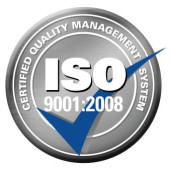The ISO 9001:2008 Quality Management System model was adopted to achieve regulatory requirements and exceed customer satisfaction. It allows organizations to offer customers a higher level of consistent products and services by developing programs to continually improve business operations.
A quality management system is essential for any organization to succeed in both meeting and exceeding customer satisfaction through continual improvement. Below you will find the eight principles of quality management:
- Customer focus
- The primary focus is to meet customer requirements and strive to exceed customer expectations. This customer-centric focus will achieve success at any level.
- Leadership
- Leaders at every level create conditions needed to succeed within an organization’s objectives. Establishing a clear vision and setting challenging goals and targets will help people understand the ‘big picture.’
- Involvement of people
- Qualified, competent and engaged employees throughout the organization are crucial to delivering value – these types of people are motivated and committed to continual improvement.
- Process approach
- Effective process management, efficient use of resources, and reduced cross-functional barriers all lead to optimized performance. This leads to lower costs and shorter turnaround times.
- System approach to management
- Operations managed by one coherent quality management system lead to greater success. An aligned and structured operation achieve desired results by focusing effort on key procedures.
- Continual improvement
- Improvement is crucial for maintaining current levels of performance as well as creating new opportunities. This objective should be permanent within every organization as it allows for an advantage in performance.
- Factual approach to decision making
- Facts, evidence and data analysis help lead to greater decision making and desired results. Making decisions based on factual analysis will lead to an increased ability to challenge and change decisions from the past.
- Mutually beneficial supplier relationships
- Carefully managing and improving supplier relationships helps to nurture a positive involvement and long-term support – this ultimately creates value by optimizing costs and resources.


